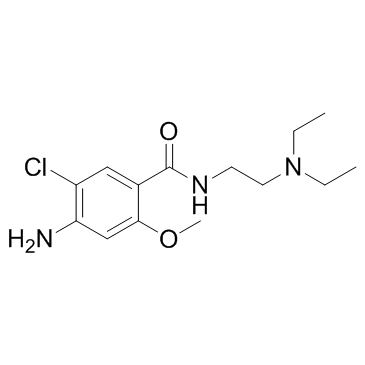Metoclopramide, H2 blockers, and proton pump inhibitors: pharmacotherapy for gastroesophageal reflux in neonates.
William F Malcolm, C Michael Cotten
Index: Clin. Perinatol. 39(1) , 99-109, (2012)
Full Text: HTML
Abstract
Pharmacotherapy for gastroesophageal reflux (GER) in neonates, aimed at interfering with this physiologic process and potentially reducing the negative sequelae that providers often attribute to GER, consists primarily of drugs that increase the viscosity of feeds, reduce stomach acidity, or improve gut motility. Medications used to treat clinical signs thought to be from GER, such as apnea, bradycardia, or feeding intolerance, are among the most commonly prescribed medications in neonatal intensive care units in the United States, despite the lack of evidence of safety and efficacy in this population.Copyright © 2012 Elsevier Inc. All rights reserved.
Related Compounds
| Structure | Name/CAS No. | Molecular Formula | Articles |
|---|---|---|---|
 |
metoclopramide
CAS:364-62-5 |
C14H22ClN3O2 |
|
The progesterone and estrogen modify the uterine prolactin a...
2015-02-01 [Gynecol. Endocrinol. 31(2) , 148-51, (2015)] |
|
Clinical challenge. Esophageal hiatal hernia.
2014-12-01 [J. Zoo Wildl. Med. 45(4) , 999-1001, (2014)] |
|
[Jejunal intussusceptions as a lead point ectopic pancreatic...
2012-01-01 [Cir. Cir. 80(6) , 546-9, (2012)] |
|
Naproxen sodium/metoclopramide: metoclopramide/naproxen-sodi...
2006-01-01 [Drugs R. D. 7(4) , 259-61, (2006)] |
|
Small intestinal contrast ultrasonography for the detection ...
2015-01-01 [J. Gastroenterol. Hepatol. 30(1) , 86-91, (2014)] |